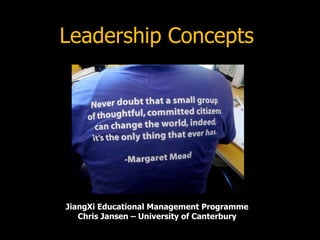
Chris Jansen (www.Ideacreation.org) - "Leadership concepts"
- 1. Leadership Concepts JiangXi Educational Management Programme Chris Jansen – University of Canterbury
- 2. Overview • Leadership competency models • Leadership vs Management • The impact of educational leadership on student achievement
- 4. Make a list of all the types of leadership you can recall… Ie: transactional leadership distributed leadership…
- 5. Leadership Literature Leadership as a concept has been widely studied from multiple professional viewpoints. • In excess of 3000 studies focusing on leadership Stoghill (1990) • UC Library database has record of 14 international journals with “Leadership” in the title • Burns (1978, 2003), Kouzes & Posner (2002), Fairholm (1998), Senge (2004), Covey (2004), Goleman (1996), Bass (1990), Seligman (2004), Buckingham (2001), Senge (2004), Zenger & Folkman (2002), Jung (2003), Jaworski (1996), Collins (2001, 2005), Cammock(2001,2008), etc Range of Leadership Models; • Transactional, Transformational, Instructional, Moral, Participative, Situational, Distributed • Leaders as learners • Personal vs professional leadership, Servant leadership / Level 5 Leadership, Sustainable Leadership 5
- 6. Kiwi Leadership for Principals 6
- 7. The Zenger-Folkman Leadership Tent CHARACTER 7
- 8. ACEL Framework (Australian Council of Educational Leadership)
- 9. Developing Chinese Leaders in the 21st Century “Lessons of experiences – China research project: 2007-2009” Based on interviews with 55 top-level executives from 6 China based companies (state controlled and private) Identified: •Events – key drivers of leadership development, experiences that drive learning and change •Lessons - represent a shift in attitudes, values, knowledge, behaviour or skill level – due to the key developmental events
- 11. Which of these leadership events have also been significant in your development as a leader?
- 13. What similar lessons have you learnt from these events?
- 14. The Role of a Manager Vision Meaningful Contribution Plan Values Organise Engage and develop Control People Administer systems Create context Critique Create Order Leadership Management (Vision & people driven) (Office bound/paper driven) Commitment, Professional Compliance Change & Hi- Technical & Status-Quo Performance Work/Service Efficiency Cammock (2001) The Dance of Leadership
- 16. What proportion of your time do you spend on leadership vs management roles? Are you satisfied with that? If not – what change could you initiate?
- 18. Student achievement outcomes Organisational capacity Leadership capacity 18
- 19. Focused in on Educational Leadership Compared the impact of transformational and pedagogical leadership on student achievement Transformational leadership: emphasises vision and inspiration, developing relationships Pedagogical/instructional leadership: emphasises the importance of establishing clear educational goals, planning the curriculum, and evaluating teachers and teaching. Findings: Impact of pedagogical leadership to be nearly four times that of transformational leadership.
- 20. Relative impact of 5 leadership dimensions of student outcomes
- 21. Related leadership knowledge, skills and dispositions
- 23. Pedagogical/Instructional Leadership in action
- 24. Which of these leadership factors also impact student achievement in the tertiary sector?
- 26. Adaptive Leadership Characterised by both; • participative processes ”Surfing the Edge of Chaos’” • collaborate solution finding Benefits: • Engagement, ownership leading to… …enthusiasm/energy and commitment • Better solutions – innovation The Pronoun Test “I” or “We” “My” or “Our” “We” or “They” Daniel Pink – “A whole new mind” “There's only one thing better than ownership – authorship! Simon Breakspear , “Talent Magnets” 26
